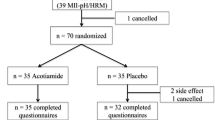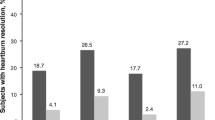Opinion statement
Considerable clinical experience with proton pump inhibitors (PPIs) attests to their efficacy and safety in short-and long-term therapy for gastroesophageal reflux disease (GERD) in erosive esophagitis and endoscopy-negative (NERD) patients. One alternative to continuous PPI maintenance is PPI therapy administered noncontinuously (eg, “on demand”). Qualities of good PPI therapy for such a modality should include fast and sustained acid suppression. The newer-generation PPI esomeprazole has provided greater acid inhibition. Randomized controlled clinical trials comparing ondemand PPI versus placebo or versus continuous PPI therapy in GERD patients have shown that on-demand therapy with currently available PPIs (esomeprazole in particular) appears to be effective in the long-term management of patients with NERD or mild esophagitis and uninvestigated forms of GERD, who make up the overwhelming majority of patients with GERD. This is because it is safe and provides adequate symptom control and sustains quality of life. However, it is not indicated in patients with severe erosive esophagitis or with complicated esophagitis (ie, Barrett’s esophagus or stricture). On-demand PPI therapy is important for economic reasons, as it may save up to two thirds of daily doses of the drugs, with a considerable containment of drug expenses. For a long-term disease whose treatment is aimed primarily at symptom control, it is a sensible and cost-effective approach.
Similar content being viewed by others
References and Recommended Reading
Dent J, El-Serag HB, Wallander MA, Johansson S: Epidemiology of gastroesophageal reflux disease: a systematic review. Gut 2005, 54:710–717.
Lagergren J, Bergstrom R, Lindgren A, Nyren O: Symptomatic gastroesophageal reflux as a risk factor for esophageal adenocarcinoma. N Engl J Med 1999, 340:825–831.
Kulig M, Leodolter A, Vieth M, et al.: Quality of life in relation to symptoms in patients with gastro-oesophageal reflux disease—an analysis based on the ProGERD initiative. Aliment Pharmacol Ther 2003, 18:767–776.
Agreus L, Borgquist L: The cost of gastro-oesophageal reflux disease, dyspepsia and peptic ulcer disease in Sweden. Pharmacoeconomics 2002, 20:347–355.
Willich SN, Nocon M, Kulig M, et al.: Cost-of-disease analysis in patients with gastro-oesophageal reflux disease and Barrett’s mucosa. Aliment Pharmacol Ther 2006, 23:371–376.
Hampel H, Abraham NS, El-Serag HB: Meta-analysis: obesity and the risk for gastroesophageal reflux disease and its complications. Ann Intern Med 2005, 143:199–211.
Kaltenbach T, Crockett S, Gerson LB: Are lifestyle measures effective in patients with gastroesophageal reflux disease? An evidence-based approach. Arch Intern Med 2006, 166:965–971.
Moayyedi P, Talley N: Gastroesophageal reflux disease. Lancet 2006, 367:2086–2100.
Donnellan C, Sharma N, Preston C, Moayyedi P: Medical treatments for the maintenance therapy of reflux oesophagitis and endoscopic negative reflux disease. Cochrane Database Syst Rev 2005, 2:CD003245.
Zacny J, Zamakhshary M, Sketris I, Van Zanten V: Systematic review: the efficacy of intermittent and on-demand therapy with histamine H2-receptor antagonists or proton pump inhibitors for gastro-oesophageal reflux disease. Aliment Pharmacol Ther 2005, 21:1299–1312.
Pace F, Tonini M, Pallotta S, et al.: Systematic review: maintenance treatment of gastroesophageal reflux disease with proton pump inhibitors taken “on-demand.” Aliment Pharmacol Ther 2007, 26:195–204.
DeVault KR, Castell DO: Updated guidelines for the diagnosis and treatment of gastroesophageal reflux disease. Am J Gastroenterol 2006, 100:190–200.
Lind T, Havelund T, Lundell L, et al.: On-demand therapy with omeprazole for the long-term management of patients with heartburn without oesophagitis—a placebo-controlled randomized trial. Aliment Pharmacol Ther 1999, 13:907–914.
Talley NJ, Lauritsen K, Tunturi-Hihnala H, et al.: Esomeprazole 20 mg maintains symptom control in endoscopy-negative gastro-oesophageal reflux disease: a controlled trial of ‘on-demand’ therapy for 6 months. Aliment Pharmacol Ther 2001, 15:347–354.
Talley NJ, Venables TL, Green JR, et al.: Esomeprazole 40 mg and 20 mg is efficacious in the long-term management of patients with endoscopy-negative gastro-oesophageal reflux disease: a placebo-controlled trial of on-demand therapy for 6 months. Eur J Gastroenterol Hepatol 2002, 14:857–863.
Bytzer P, Blum A, De Herdt D, et al.: Six-month trial of on-demand rabeprazole 10 mg maintains symptom relief in patients with nonerosive reflux disease. Aliment Pharmacol Ther 2004, 20:181–188.
Scholten T, Dekkers CP, Schutze K, et al.: On-demand therapy with pantoprazole 20 mg as effective long-term management of reflux disease in patients with mild GERD: the ORION trial. Digestion 2005, 72:76–85.
Kaspari S, Kupcinskas L, Heinze H, Berghofer P: Pantoprazole 20 mg on demand is effective in the long-term management of patients with mild gastro-oesophageal reflux disease. Eur J Gastroenterol Hepatol 2005, 17:935–941.
Bigard MA, Genestin E: Treatment of patients with heart-burn without endoscopic evaluation: on-demand treatment after effective continuous administration of lansoprazole 15 mg. Aliment Pharmacol Ther 2005, 22:635–643.
Bour B, Staub JL, Chousterman M, et al.: Long-term treatment of gastro-oesophageal reflux disease patients with frequent symptomatic relapses using rabeprazole: ‘on-demand’ treatment compared with continuous treatment. Aliment Pharmacol Ther 2005, 21:805–812.
Sjöstedt S, Befrits R, Sylvan A, et al.: Daily treatment with esomeprazole is superior to that taken on-demand for maintenance of healed erosive oesophagitis. Aliment Pharmacol Ther 2005, 22:183–191.
Hansen N, Bergheim R, Fagertun H, et al.: A randomised prospective study comparing the effectiveness of esomeprazole treatment strategies in clinical practice for 6 months in the management of patients with symptoms of gastroesophageal reflux disease. Int J Clin Pract 2005, 59:665–671.
Tsai HH, Chapman R, Shepherd A, et al.: Esomeprazole 20 mg on-demand is more acceptable to patients than continuous lansoprazole 15 mg in the long-term maintenance of endoscopy-negative gastro-oesophageal reflux patients: the COMMAND study. Aliment Pharmacol Ther 2004, 15:657–665.
Hansen AN, Wahlqvist P, Jorgensen E, et al.: Six-month management of patients following treatment for gastroesophageal reflux disease symptoms—a Norwegian randomized, prospective study comparing the costs and effectiveness of esomeprazole and ranitidine treatment strategies in a general medical practitioners setting. Int J Clin Pract 2005, 59:655–664.
Labenz J, Petersen KU, Rosch W, Kolez HR: A summary of Food and Drug Administration-reported adverse events and drug interactions occurring during therapy with omeprazole, lansoprazole and pantoprazole. Aliment Pharmacol Ther 2003, 17:1015–1019.
Dial S, Delaney JA, Barkun AN, Suissa S: Use of gastric acid-suppressive agents and the risk of community-acquired Clostridium difficile-associated disease. JAMA 2005, 294:2989–2995.
Laheij RJ, Sturkenboom MC, Hassing RJ, et al.: Risk of community-acquired pneumonia and use of gastric acid-suppressive agents. JAMA 2004, 292:1955–1960.
Pace F, Manes G, Conio M, Bianchi Porro G: Pretreatment endoscopy—pro & contra: endoscopy is needed before treatment in all patients with gastroesophageal reflux disease. Endoscopy 2006, 38:271–275.
Author information
Authors and Affiliations
Corresponding author
Rights and permissions
About this article
Cite this article
Pace, F., Porro, G.B. On-demand PPI therapy in GERD. Curr Treat Options Gastro 11, 35–42 (2008). https://doi.org/10.1007/s11938-008-0005-y
Published:
Issue Date:
DOI: https://doi.org/10.1007/s11938-008-0005-y




